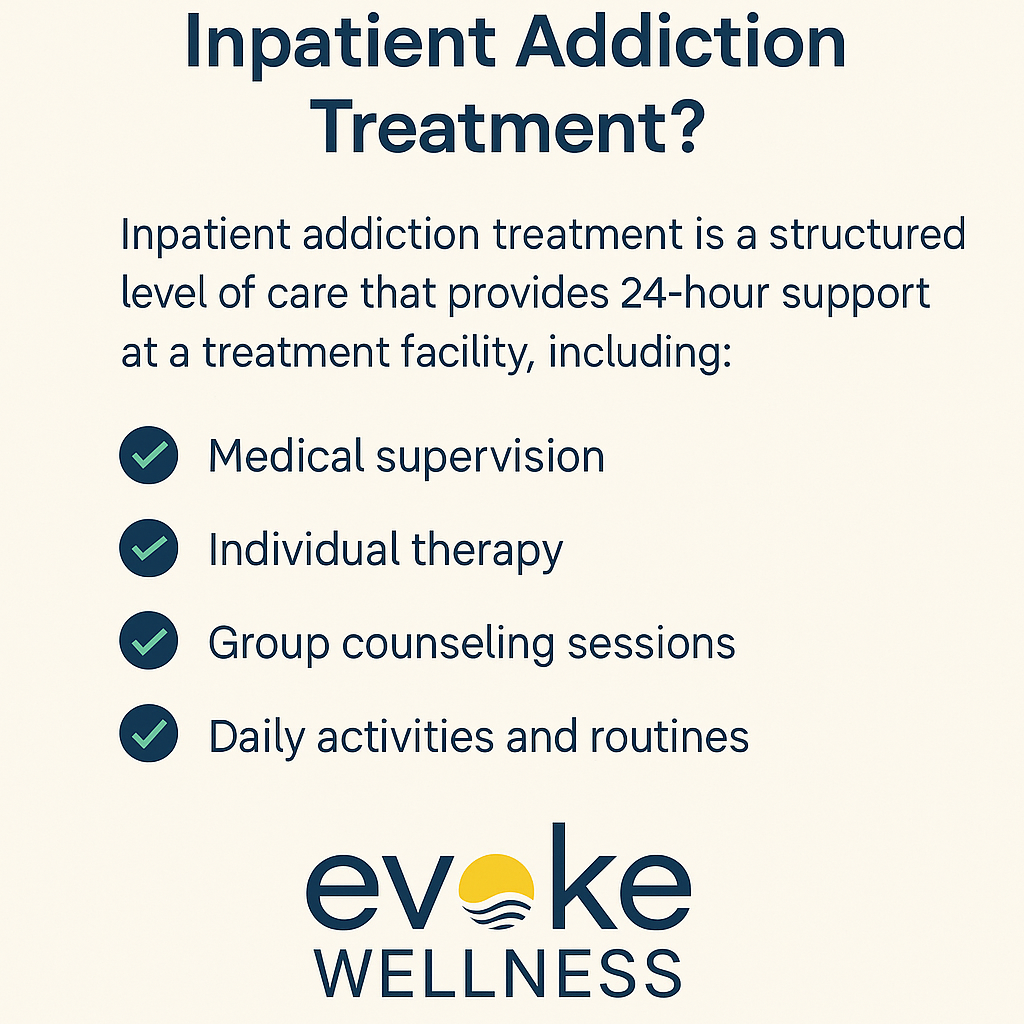When someone you love is struggling with addiction, the decision to seek treatment often comes with relief and fear all at once. You may finally feel like there’s hope—but now you’re faced with another unknown: What does inpatient addiction treatment actually look like?
For parents, this can be one of the most vulnerable moments in your life. You want to make the right decision, but you’re navigating a system that feels foreign, and your child is in crisis. You’re not alone—and you don’t have to figure it all out on your own.
At Evoke Wellness Ohio, we’ve walked this road with many families in Columbus and beyond. This guide is designed to give you clarity, reassurance, and a clear sense of what inpatient treatment really involves.
What Is Inpatient Addiction Treatment?
An Intensive Inpatient Treatment Program in Ohio offers a structured, immersive level of care where individuals live onsite at a treatment center. It provides 24-hour support, including medical oversight, therapy, and a daily routine focused on recovery.
Unlike outpatient care—where the person goes home at the end of the day—inpatient treatment provides a protected space where your loved one can focus entirely on their healing without distractions or access to substances.
It’s especially recommended when:
- Someone is at high risk of relapse
- Detox or medical stabilization is needed
- Home or social environments are not supportive of recovery
- Co-occurring mental health issues complicate recovery
At Evoke Wellness Ohio, inpatient care isn’t about controlling someone’s every move—it’s about creating safety, structure, and a foundation for long-term healing.
A Day in the Life: Inside an Inpatient Program
What happens once your loved one enters treatment? Here’s a typical day to help you visualize it:
Morning:
- Wake-up routine and hygiene
- Nutritious breakfast
- Morning mindfulness or meditation
- Community group check-in
Midday:
- One-on-one therapy session
- Life skills or relapse prevention group
- Lunch and free time
- Process group therapy or educational workshop
Afternoon:
- Holistic sessions like yoga, art, or fitness
- Medical or psychiatric check-ins
- Journaling, reading, or solo reflection
Evening:
- Dinner
- 12-step or peer support meeting
- Evening wind-down or gratitude practice
This structure is designed not just to keep clients busy—but to build rhythms that restore regulation, confidence, and emotional clarity.
What Types of Therapy Are Used?
Every person’s path is different. That’s why quality inpatient programs—like ours at Evoke Wellness Ohio—offer a blend of therapies tailored to the person’s needs.
Core therapies include:
- Individual Therapy: Weekly one-on-one sessions with a licensed counselor to process trauma, identify triggers, and set recovery goals.
- Group Therapy: Facilitated sessions where clients learn and share with peers, building connection and accountability.
- Family Therapy: Helps parents and loved ones understand addiction and rebuild communication patterns.
- Psychoeducation: Teaches about the science of addiction, emotional regulation, and coping tools.
- Experiential Therapies: Activities like music, art, movement, or equine-assisted therapy engage different parts of the brain and promote emotional healing.
If your loved one has co-occurring mental health conditions like anxiety, depression, or PTSD, integrated care is available—addressing both issues at once.
Who Provides Care in an Inpatient Program?
This is one of the most common concerns from parents: Who will be with my child? Are they qualified? Will they treat them with kindness?
At Evoke Wellness Ohio, your loved one will be cared for by:
- Medical doctors and nurses experienced in detox and addiction medicine
- Licensed therapists and counselors trained in trauma-informed care
- Psychiatrists and nurse practitioners who manage medications and mental health
- Behavioral health technicians who offer support and maintain structure throughout the day
- Case managers who coordinate aftercare planning and family communication
This is a team effort—and every member is committed to treating your loved one with dignity and compassion.
How Long Does Treatment Last?
Most inpatient programs last between 30 and 90 days, depending on the person’s needs, insurance, and progress. At Evoke, we work with each client to develop a custom treatment timeline—and that includes conversations with family (when appropriate) about goals and next steps.
Length of stay is often broken into phases:
- Stabilization & Detox (if needed)
- Therapeutic Immersion & Skill Building
- Discharge Planning & Transition to Outpatient Care
Recovery doesn’t stop after discharge. A strong aftercare plan is a critical part of the process—and we’ll help your family understand what options come next.
What Can Parents and Families Do During Treatment?
It can feel powerless to be on the outside looking in. But you’re still part of this healing process. Here’s how families can stay involved:
- Join family sessions if offered (virtually or in-person)
- Write letters or emails of support—without pressure or guilt
- Start your own healing through Al-Anon, therapy, or a local support group
- Ask questions about the process—you deserve to understand
Caring for someone in treatment doesn’t mean fixing everything. It means showing up with honesty, steadiness, and a willingness to learn alongside them.
FAQ: Inpatient Treatment for Addiction
How do I know if inpatient treatment is the right choice?
Inpatient care is best for those who need stability, structure, or round-the-clock support. If your child has relapsed multiple times, lives in an unsafe environment, or struggles with co-occurring mental health issues, inpatient may be the safest and most effective option.
Can I talk to my child during treatment?
Yes—though early in treatment, communication may be limited to support stabilization. As they progress, phone calls, visits, and family sessions are often encouraged. Our staff will help you navigate this in a healthy, supportive way.
Is detox included in inpatient treatment?
If your loved one needs detox, it typically begins upon admission. Medical staff will manage withdrawal symptoms and monitor physical safety. After detox, the therapeutic phase of inpatient care begins.
What if my child doesn’t want to stay?
We recognize this fear. While treatment is voluntary in most cases, our team uses compassionate engagement to encourage commitment. If your loved one leaves early, we will offer you guidance and next steps.
How much does inpatient treatment cost?
Cost depends on the length of stay, services provided, and insurance coverage. Our admissions team can help verify benefits and provide financial clarity before enrollment.
You’re Not Alone—We’re Here to Help
Inpatient addiction treatment can feel overwhelming, but it doesn’t have to be a mystery. At Evoke Wellness Ohio, we believe families deserve clarity and compassion just as much as the person in treatment.
You’re doing the best you can in a hard moment—and that matters.
Have more questions? Want to talk it through?
Call us at (866) 430-9267 Or learn more about our intensive inpatient treatment program in Ohio. We’ll meet you where you are—and help you move forward.



